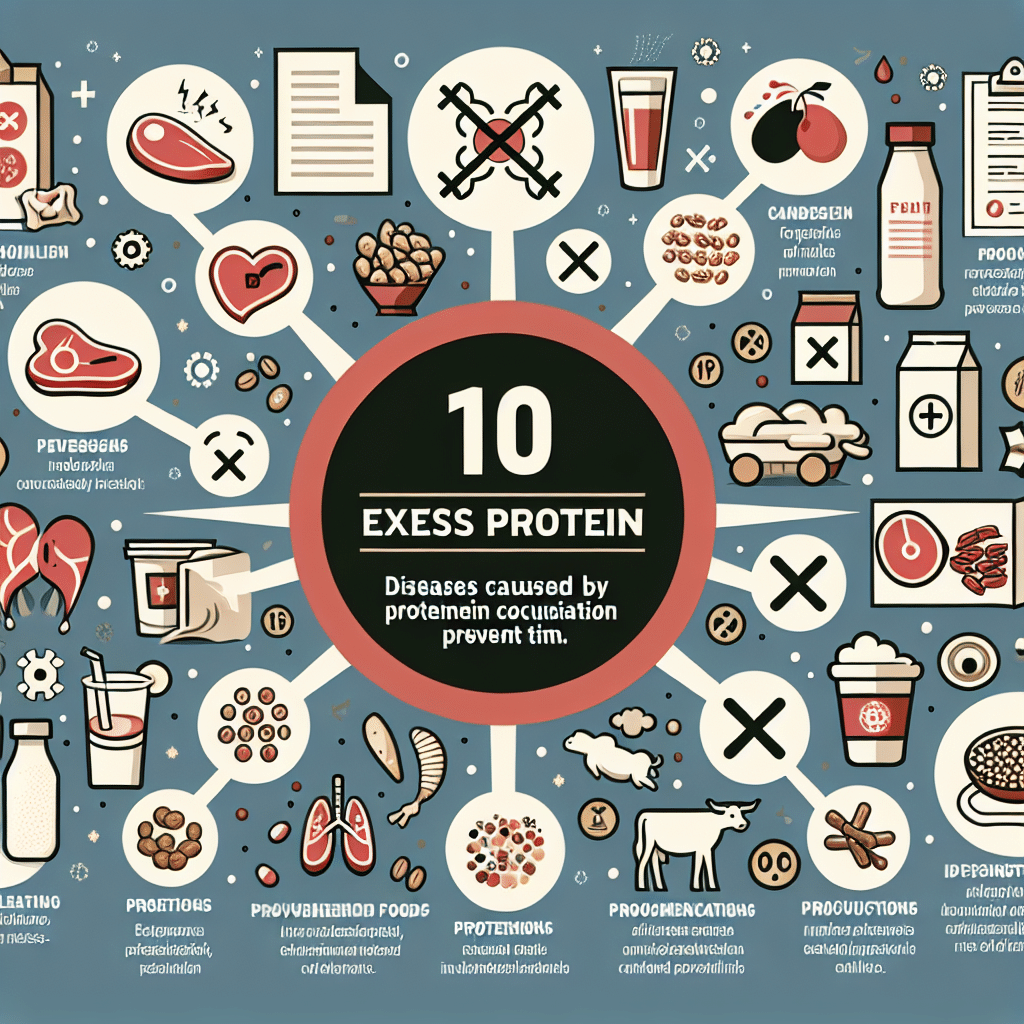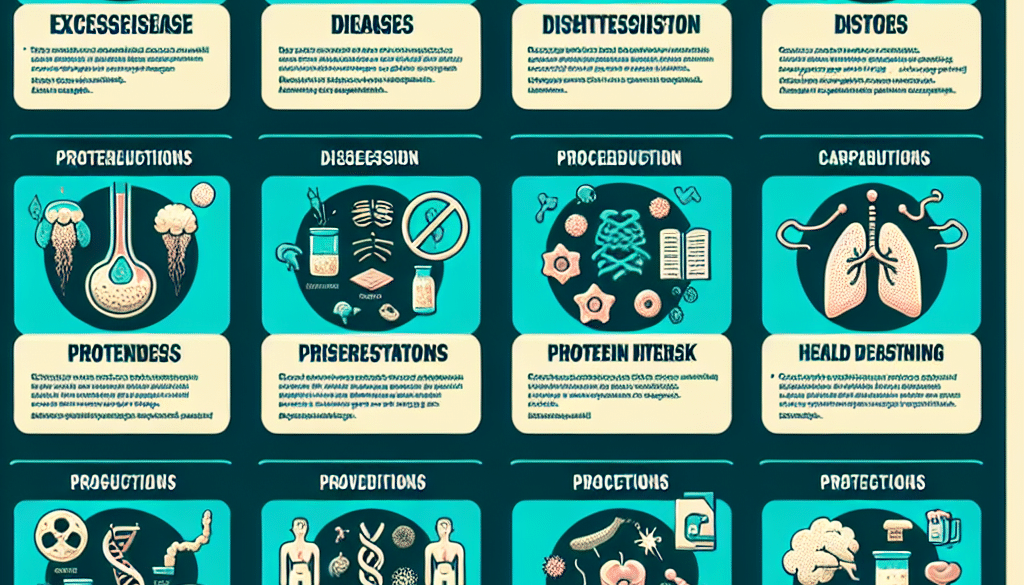10 Enfermedades por Exceso de Prote??nas: Precauciones
-
Table of Contents
- 10 Health Risks Associated with Excessive Protein Intake: Precautionary Measures
- Understanding Protein and Its Importance
- 1. Kidney Damage
- 2. Dehydration
- 3. Nutrient Deficiencies
- 4. Digestive Issues
- 5. Heart Disease
- 6. Increased Cancer Risk
- 7. Bone Health Issues
- 8. Weight Gain
- 9. Liver Function
- 10. Metabolic Stress
- Precautionary Measures for Protein Intake
- Conclusion
- Recommended Protein Products from ETprotein
10 Health Risks Associated with Excessive Protein Intake: Precautionary Measures

Protein is a vital macronutrient that plays a crucial role in building muscle, repairing tissue, and producing enzymes and hormones. However, like many things in life, too much of a good thing can be harmful. Excessive protein intake can lead to a range of health issues that should not be overlooked. In this article, we will explore ten potential health risks associated with protein overconsumption and provide precautionary measures to maintain a balanced diet.
Understanding Protein and Its Importance
Proteins are made up of amino acids, which are the building blocks of our body’s structures and functions. While protein is essential for growth and maintenance, the amount required varies depending on age, sex, physical activity level, and overall health.
1. Kidney Damage
High protein diets can put extra strain on the kidneys, which are responsible for filtering waste products from the blood. Over time, this can lead to kidney damage or exacerbate pre-existing kidney conditions. Studies have shown that individuals with kidney disease should be particularly cautious with their protein intake.
2. Dehydration
The body needs more water to metabolize protein. Without adequate hydration, increased protein can lead to dehydration, as the kidneys work harder to eliminate the byproducts of protein metabolism.
3. Nutrient Deficiencies
Overemphasis on protein can lead to an imbalance in the diet, potentially causing deficiencies in other nutrients such as fiber, vitamins, and minerals found in fruits, vegetables, and whole grains.
4. Digestive Issues
Excessive protein, especially from animal sources, can lead to digestive problems such as constipation or diarrhea due to the lack of fiber in such diets.
5. Heart Disease
Some high-protein diets are also high in saturated fats, which can increase the risk of heart disease. It’s important to choose proteins that are low in saturated fat for heart health.
6. Increased Cancer Risk
Some research suggests that high consumption of red and processed meats, which are protein-rich, may be linked to an increased risk of certain types of cancer, including colorectal cancer.
7. Bone Health Issues
There is some evidence that very high protein intake can lead to calcium leaching from the bones, potentially leading to osteoporosis. However, this is still a debated topic among experts.
8. Weight Gain
While protein can help with weight loss by increasing satiety, excessive intake can lead to weight gain, as excess calories from any source are stored as fat.
9. Liver Function
Just like the kidneys, the liver can be stressed by processing the byproducts of protein metabolism. This is particularly a concern for individuals with liver disease.
10. Metabolic Stress
High levels of protein can cause metabolic stress, which can exacerbate existing metabolic disorders and disrupt normal metabolic processes.
Precautionary Measures for Protein Intake
- Consult a Healthcare Professional: Before making any significant changes to your diet, especially if you have pre-existing health conditions, consult with a healthcare professional.
- Balance Your Diet: Ensure that your diet includes a variety of foods to provide all necessary nutrients.
- Stay Hydrated: Increase your water intake if you consume a lot of protein.
- Choose Quality Protein Sources: Opt for lean meats, fish, dairy, legumes, and plant-based proteins.
- Monitor Your Health: Keep an eye on your kidney and liver function through regular check-ups if you’re on a high-protein diet.
Conclusion
While protein is an essential part of a healthy diet, it is important to consume it in moderation and be aware of the potential health risks associated with excessive intake. By following the precautionary measures outlined above, you can enjoy the benefits of protein without putting your health at risk.
Recommended Protein Products from ETprotein
If you’re looking for high-quality protein sources, consider ETprotein’s range of plant-based protein products. Their offerings include organic rice protein, clear rice protein, pea protein, and more. These products are non-GMO, allergen-free, and cater to a variety of industries, ensuring that you can find a protein source that fits your dietary needs and preferences.
About ETprotein:
ETprotein, a reputable plant protein vegan protein Chinese factory manufacturer and supplier, is renowned for producing, stocking, exporting, and delivering the highest quality organic bulk vegan protein and plant proteins. They include Organic rice protein, clear rice protein, pea protein, clear pea protein, watermelon seed protein, pumpkin seed protein, sunflower seed protein, mung bean protein, peanut protein etc. Their offerings, characterized by a neutral taste, non-GMO, allergen-free attributes, cater to a diverse range of industries. They serve nutraceutical, pharmaceutical, cosmeceutical, veterinary, as well as food and beverage finished product distributors, traders, and manufacturers across Europe, USA, Canada, Australia, Thailand, Japan, Korea, Brazil, and Chile, among others.
ETprotein specialization includes exporting and delivering tailor-made protein powder and finished nutritional supplements. Their extensive product range covers sectors like Food and Beverage, Sports Nutrition, Weight Management, Dietary Supplements, Health and Wellness Products, and Infant Formula, ensuring comprehensive solutions to meet all your protein needs.
As a trusted company by leading global food and beverage brands and Fortune 500 companies, ETprotein reinforces China’s reputation in the global arena. For more information or to sample their products, please contact them and email sales(at)ETprotein.com today.












